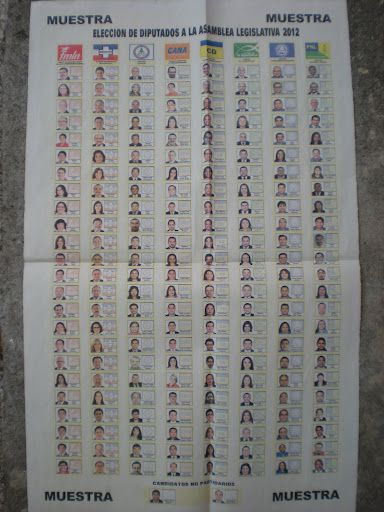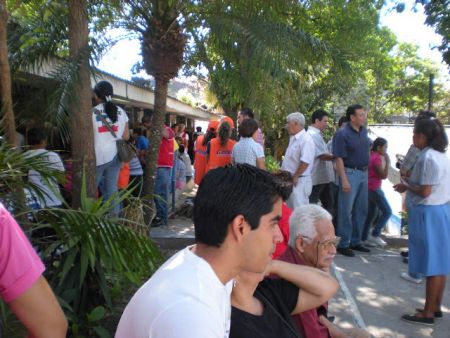STORY posted on March 11, 2012 by flux
Report on Elections Today in El Salvador
Entire families join 'civic celebration'
Also posted by flux:
Also in :
SAN SALVADOR - Today, 4.6 million Salvadoreans will vote to elect 84 national assembly deputies and 262 municipal councils, after what seems like a long campaign.
As you drive down ANY street, even the smallest, in San Salvador, and other cities, towns and cantons, you see electoral propaganda everywhere - on light poles, fences, walls, houses, bridges, and of course, the ever present billboards and "mupis" (smaller-scale billboards that litter San Salvador streets - usually full of cell phone advertisements).
TV is a constant, back-to-back bombardment of electomercials for this party and that, set to salsa music; and the morning and evening news talk of little else. To someone who comes from a country where elections have become indifferent events; where voters are cynical and disengaged; and where, at the present time - the country is embroiled in an embarrassing scandal of pre-electoral fraud - this election is refreshing, and here's why:
When you observe the people involved in political rallies, and hear them talking about issues (not candidates), you will notice that many of them are under 30. Yes, youth in this country are politically engaged in striking numbers. That's because there are LOTS of them, and they realize what power they hold, they care what happens to their country, and they still believe they can do something to make it a better place and want to be part of it.
Election day is referred to as a civic party or celebration - entire families go to voting stations, even if they are not all of an age to vote. I saw parents today showing their children how they vote; there were information and celebratory tents set up by political parties on the way to the voting centre; music, balloons, food and drink (although no alcohol is sold anywhere for three entire days, leading up to, and including election day); and TV and radio report all day long on how the elections are going, interviewing voters, and explosing incidents of fraud and irregularities (more on that later).
Political activism is not a "dirty" word, and those who are politically active (and there are millions) are not considered to be "radicals". Even the poorest people know their rights and why they are voting (and they'll tell you!). Some of the most articulate and dedicated people I have met are poor campesinos who have fought for years for changes that would improve their living conditions.
Despite recent "North American style" changes to the ballot, most voters still vote for a party platform or program, rather than an individual. Traditionally, El Salvador's ballot has only indicated the flags of political parties - parties themselves then prioritize the candidates that will take available positions, based on the number of votes they receive. They have now added individual photographs of candidates - which means you can show your preference for an individual, as well as the party. Many people I spoke with think this dilutes the approach of voting for a political program, by introducing individualism into elections - after all, they say, it's not about what your hair looks like or if you are more articulate in public - it's about the policies and programs you and your colleagues support, and what you will do as a party, should you win.
Unlike elections in the past, cases of fraud and irregular incidents (recently made unlawful) are quickly exposed through radio, telephone, Twitter, the internet, etc - and investigated and dealt with quickly.
I volunteered in this election to train international electoral observers. I first had to receive training myself (4 times!!) in order to understand what seems like a very complicated system. In my training, I encountered hundreds of well-organized, enthusiastic, dedicated, excited, optimistic individuals that believe in defending the people's right to vote in elections that are peaceful, clean, and where the vote is secret. Mobilizing people doesn't seem to be a problem - when a meeting is called, even on short notice - a hundred people could show up.
A great deal of my time was spent explaining the thousand-and-one-ways to commit fraud - something I had never encountered in my life. Here are just a few real-life examples of pre-electoral and election day fraud to curl your hair:
- An ARENA candidate distributed free raffle tickets to all families in the municipality, promising to draw the winning tickets if/when she won (a form of vote buying). The prizes? Two cows, 5 50 inch plasma TVs, and a week's holiday at a beach resort. (Perpetrator caught and charged).
- Three bags of notes containing death threats aimed at youth voters were found in the trunk of an ARENA campaign vehicle - thankfully before they were distributed. (Three perps caught and charged).
- Pre-marked ballots (for ARENA) have turned up today at several voting centres. (Ballots secuestered as evidence).
- Busloads of Guatemalans and Hondurans with false voter ID discovered in the centre of town. Canadian observers removed paper covering their licence plates to take pictures so they could be investigated and charged.
- Voters who take pictures of their marked ballot with a cellphone in order to prove they voted for a particular party candidate - to receive $10 or $20, or to prevent losing their jobs (they have to show the picture to the boss to prove they voted for his/her party). This was avoided this year by prohibiting cellphones/cameras in voting booths.
- Workers at voting stations pre-arranging that they will "forget" to ink the thumbs of voters after they have voted (so they can vote again) ....... An ARENA voter was caught today with THREE voter ID cards trying to vote three times (duh - the ink on your finger DOESN'T come off - she was charged with fraud).
- The campaign headquarters of the FMLN in San Vicente was sprayed with a chemical fertilizer one evening (through the door), and 10 campaign workers were taken to hospital.
- Workers at the voting stations intentionally smudging/smearing ballots so they can be declared null - this was avoided this year with the use of dry markers for voting.
Most people here agree - El Salvador has come a long way since the signing of the Peace Accords 20 years ago, but there is still a long way to go. Congratulations El Salvador for taking your democratic process seriously; for defending the right of all people to vote; and for participating in a peaceful, festive process! Much later tonight - we will see the results .......will voters choose to continue the process of change initiated in 2009? Or will they turn back to the past - as my father always says "we'll see"!!
NOTE: There are 9 political parties running in the elections - 2 on the left, and the rest on the right. Politics are extremely polarized in El Salvador - there is no centre. The strongest parties are the FMLN (party of government: left), ARENA (ruled El Salvador for 20 yrs: right), GANA (new splinter party of people p-o'd w. ARENA: right). It is believed many of the smaller parties will disappear after this election - not being able to achieve the 3% minimum of the vote.
The site for the Vancouver local of The Media Co-op has been archived and will no longer be updated. Please visit the main Media Co-op website to learn more about the organization.

